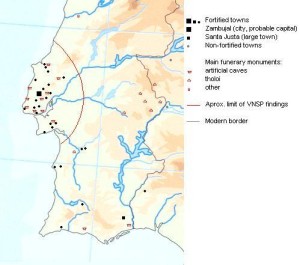Portugal
Portugal, in the 12th century, began as a county, that is, governed by a count. Wikipedia notes that it “refers to two successive medieval counties in the region around Braga and Porto, today corresponding to littoral northern Portugal, within which the identity of the Portuguese people formed. The first county existed from the mid-ninth to the mid-eleventh centuries as a vassalage of the Kingdom of Asturias and later the Kingdoms of Galicia and León, before being abolished as a result of rebellion. A larger entity under the same name was then re-established in the late 11th century and subsequently elevated by its count in the mid-12th century into an independent Kingdom of Portugal.”
Impressive megalithic sites are to be found in Portugal, among which is the large Almendres Cromlech (Cromeleque dos Almendres) near Evora. It still has 93 huge stones that form two concentric rings. They were erected there around 4000-5000 BC making them about 2000 years older than Stonehenge(a).
>A recent article(e) on Graham Hancock’s website by Leonard Wolf describes a number of megalithic sites in Portugal that he personally explored including some in the Evora district in 2022. In 2015, the same Mr. Wolf published a lengthy paper(f) advocating a site off the coast of Mexico’s Yucatan Peninsula as the location of Atlantis.<
According to Mel Nicholls [0944], the Bell Beaker culture originated in Portugal around 2800 BC and has nominated the Beaker people in Britain as Atlantean, whereas Donald Ingram argues that their successors in Britain, the Wessex II culture were Atlantean.
Portugal entered the Atlantis Stakes with a claim by a Basque researcher, Luis Aldamiz, that a little-known ancient civilisation, known as the Villa Nova  de São Pedro (VNSP) culture matched much of Plato’s description of Atlantis(b). Its capital was Zambujal, which was located on a mountain in the centre of the Estramadura peninsula, near modern Lisbon. Originally it was described as a ‘perriruthos’, which indicates something surrounded by water. Aldamiz notes that ten tombs were found there; reminiscent of the ten kings of Atlantis. Zambujal had large complex fortifications. Aldamiz claims that this civilisation fought against the Greeks during the Middle Bronze Age. He further believes that the destruction of his Atlantis was caused by an event that was similar to the 1755 Lisbon earthquake that caused such death and destruction.
de São Pedro (VNSP) culture matched much of Plato’s description of Atlantis(b). Its capital was Zambujal, which was located on a mountain in the centre of the Estramadura peninsula, near modern Lisbon. Originally it was described as a ‘perriruthos’, which indicates something surrounded by water. Aldamiz notes that ten tombs were found there; reminiscent of the ten kings of Atlantis. Zambujal had large complex fortifications. Aldamiz claims that this civilisation fought against the Greeks during the Middle Bronze Age. He further believes that the destruction of his Atlantis was caused by an event that was similar to the 1755 Lisbon earthquake that caused such death and destruction.
Lereno Barradas was a Portuguese writer who speculated in the early 1970s that Tartessos could be identified with Atlantis and that it had been located in the Tagus estuary near the site of modern Lisbon. He also suggested that these ancient Atlanteans had travelled to America.
In 1989 another Portuguese researcher, José Antunes, proposed that Atlantis had been situated in what is now northwest of Lisbon between Sintra and Mafra.
A more radical theory has been put forward by Roger Coghill, the British bioelectromagnetic investigator, who suggests on his website that Atlantis was located in the vicinity of Faro in the Algarve. Coghill expanded on his theory in his book, The Message of Atlantis[494]. He has also drawn attention to a book [1562] by Antonio Jose Lopes Navarro, published in 1983, in which he has brought together a number of classical references to the prehistory of the Algarve.
Portugal got further attention in 2013 when another British researcher, Peter Daughtrey, who then lived in Portugal, published Atlantis and the Silver City [893] in which he designates not just the Algarve and the submerged area in front of it as Atlantis, but the whole of that south-west Iberian region.
Daughtrey’s book has been updated and contains what he calls “dramatic new evidence”. His book is supported by a website(d), where you will find additional articles, interviews and reviews.
The late Steven Sora suggested [0395] that the Etruscans were refugees from their original homeland in Iberia, where he also located Troy/Atlantis. He specified Lisbon, Setubal and Troia, all in modern Portugal, as Trojan/Atlantean territory, conflating the Trojan and Atlantean wars, although placing those conflicts 4,000 km away from the battleground at Hissarlik, where Eberhard Zangger claims his Troy, which he also deemed to be identical with Atlantis was located!
Apart from the mainland claims the Portuguese Atlantic archipelagos of Azores and Madeiras have also been identified by several commentators as probable Atlantis locations.
Manuel J.Gandra has produced a valuable bibliography(c) of Portuguese sources dealing with Atlantis.
(a) https://www.atlasobscura.com/places/almendres-cromlech
(b) https://www.geocities.ws/luis_aldamiz/Atlantis/Atlantis.html
(c) Wayback Machine (archive.org)
(d) https://www.atlantisandthesilvercity.com
